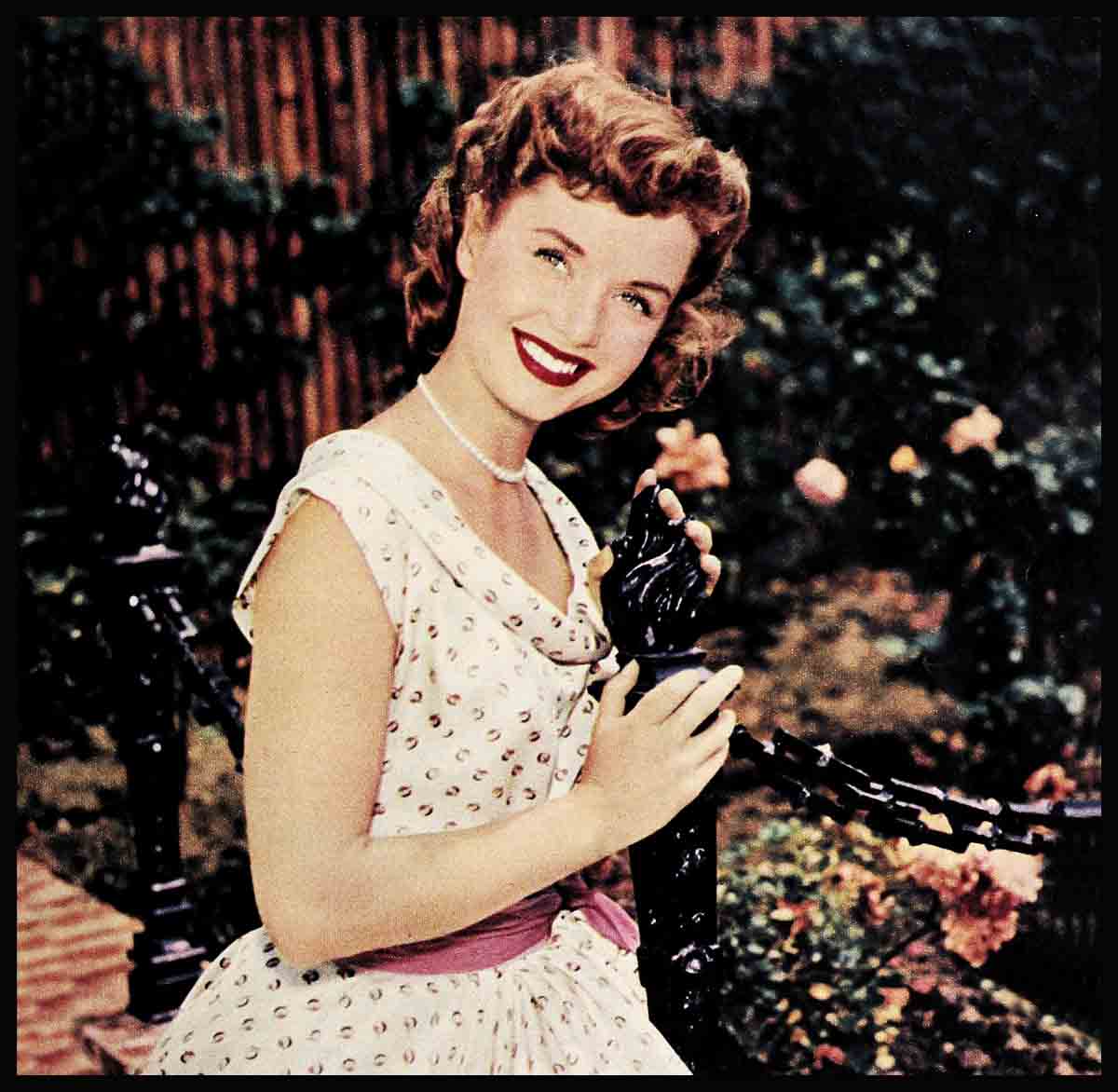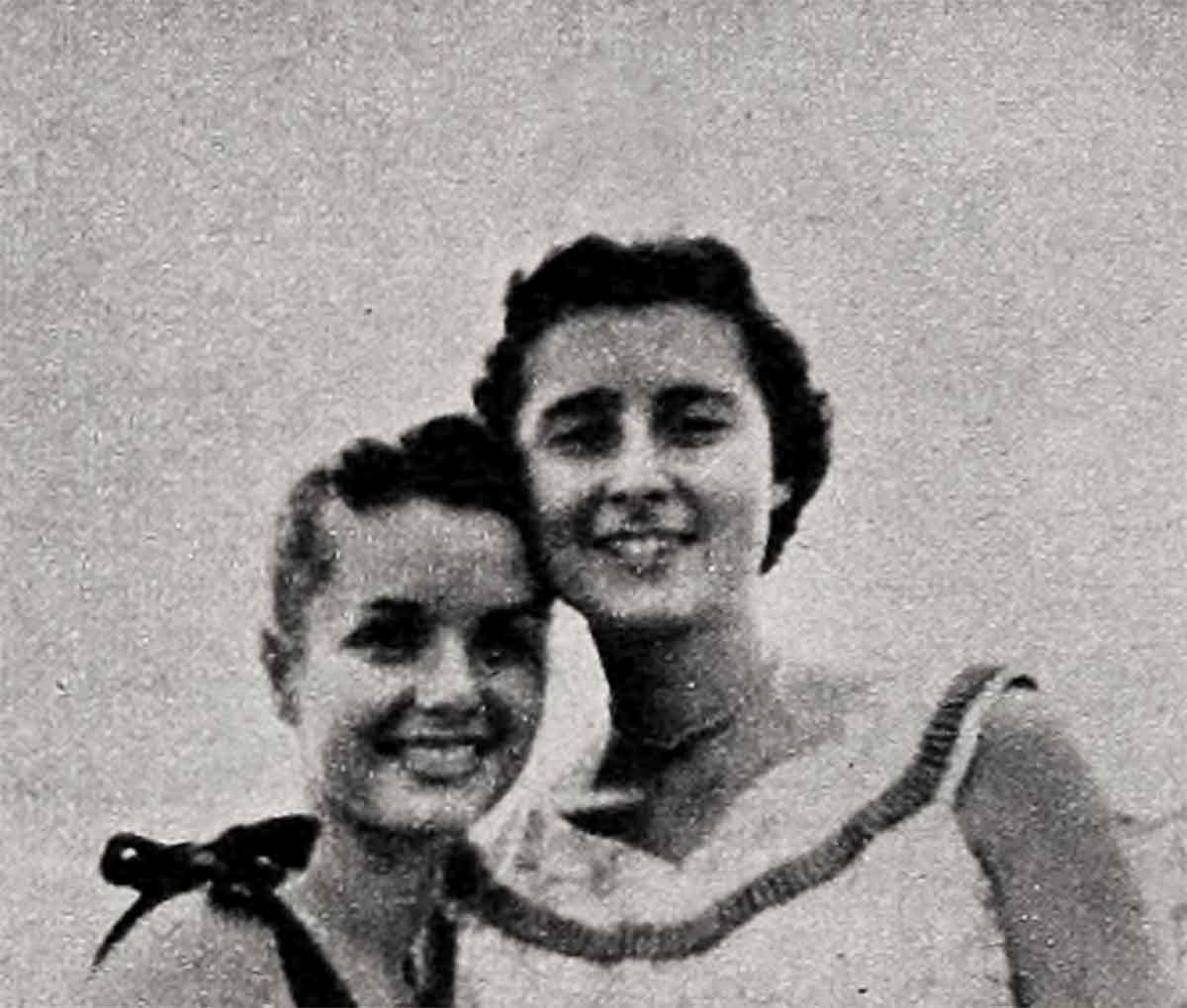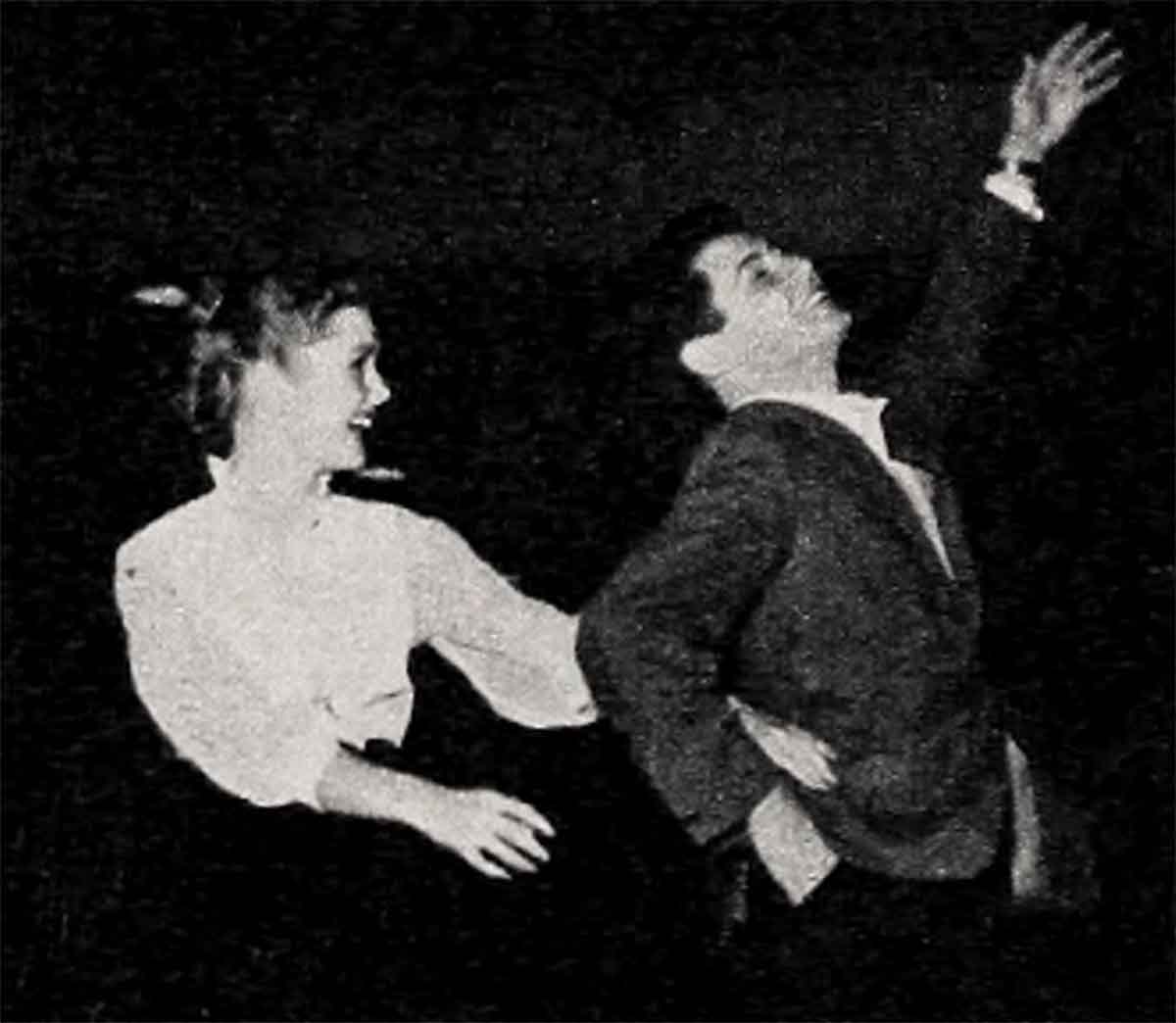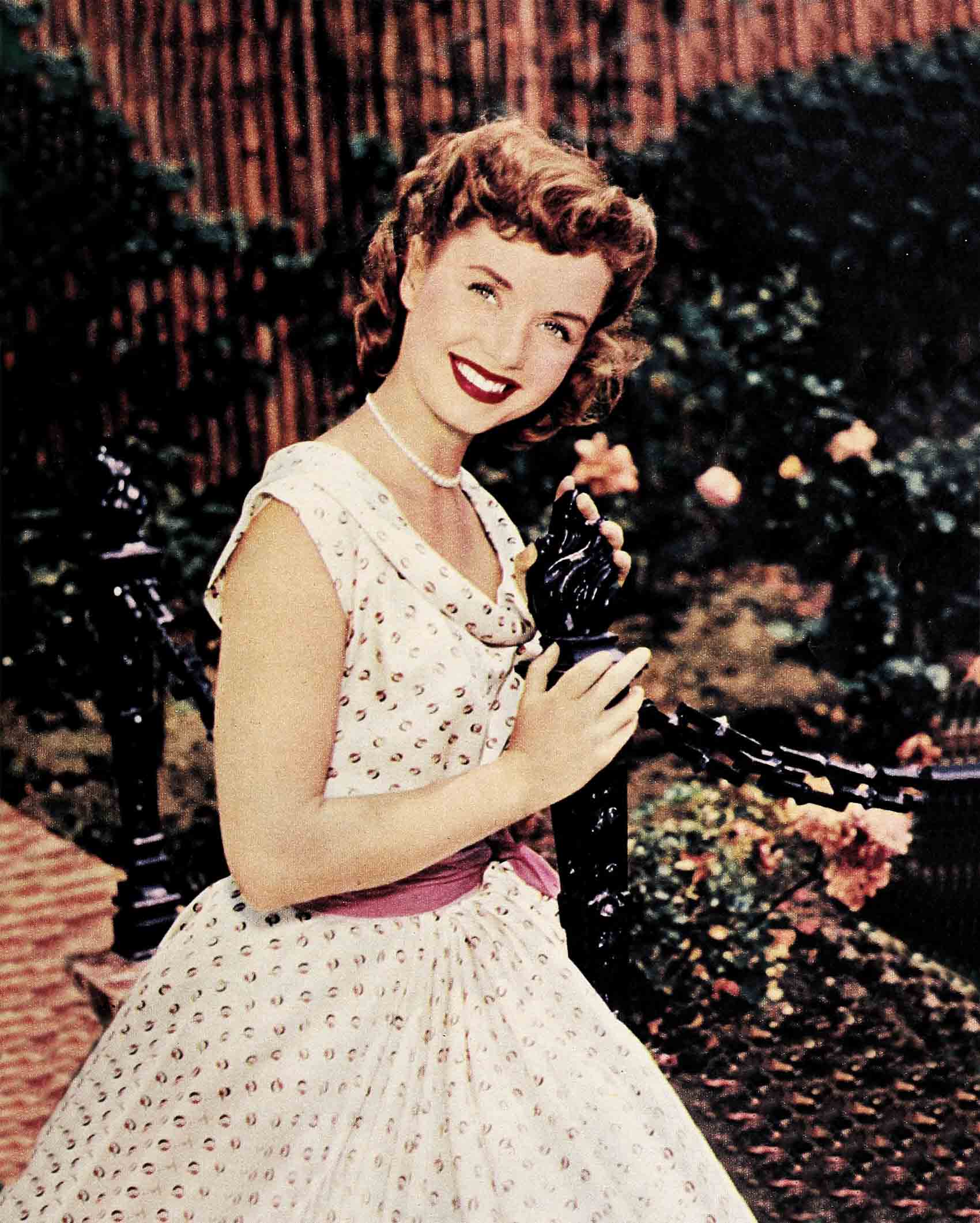
Hi, Debbie Reynolds, I’m Talking About You
Looking back, it hardly seems possible that I’ve known Debbie Reynolds almost eight years now. Seems only like yesterday that I bumped into her in gym class. We hit it off right away, and for the rest of junior high, we were what our parents called, “partners in crime.” We did everything together—went to the show on Saturday afternoon; played baseball after school; camped out with the Girl Scouts; borrowed sweaters, loaned lunch money and studied together. We’re still good friends. In fact, Deb’s my closest friend (which means I know her well enough never to know what to expect from her).
For instance, one Saturday afternoon I set myself a rigid schedule, for I had lots of work to prepare for my class on Monday. I was in the bathroom sudsing my hair when the telephone rang and Mom called upstairs to tell me Debbie was on the phone. “Can I call her back?” I shouted. “I’m washing my hair.”
Mom called up a few seconds later, “Deb says she’ll wait.”
Twenty minutes later, Debbie was still hanging on. I never thought she could sit still for twenty minutes let alone hang on to a telephone for that long, and I had wagered a silent bet with myself that she’d hang up before I got down.
“Can you come over tonight?” she asked. “I have something to show you.”
“Can’t make it tonight,” I begged off. “I’m just loaded down with test papers. How about Tuesday?”
“Tuesday,” came the loud scream from the other end of the phone. “Why that’s almost next year.”
And who can refuse Debbie Reynolds? Two minutes later I was saying, “Okay, I’ll be over in half an hour. But what’s all the excitement?”
Half hour later, I found out. Debbie must have been watching for me, for the minute I reached the front steps she was opening the door and thrusting out her hand to me. On her fourth finger, left hand, was the most beautiful diamond ring I’ve ever seen. Breathlessly happy, Debbie admitted, “This is what I wanted to tell you about. I wanted you to be one of the first. . .”
I had no inkling that Debbie was going to become engaged so soon. In fact, she’d never seriously discussed Eddie with me. But then, this is typical of Debbie. In all the years I had known her, not once has she discussed the boys she dated, other than speaking about them generally, like whom she went to a party with or to the movies the week before. I couldn’t tell you who Debbie kissed in high school, if she kissed anyone at all, or if she’ll get married next month. Some things, she feels, concern only herself and when there is something to be told, she does it at the proper time and in the proper way.

Debbie changed in one respect though. Her taste in men is different. In school, nothing else mattered except that the guy be a good athlete. Little impressed was she by anything else. If he was a really keen fellow and not good at any sports, you could bet your life that before long he’d either joined her baseball team or learned to skate.
Today, Debbie pays more attention to a person’s sincerity, straightforwardness, to his philosophy of life and his personality than to his physical prowess. Although I’ll venture to say that if Eddie doesn’t share now some of the sports Debbie’s interested in, he will!
There’s little doubt in my mind that Debbie will make a wonderful wife. She’s intelligent, easy to get along with, always tries to please and, what’s more, she’s always enthusiastic—even about keeping house, cooking, shopping and other domestic chores.
There’s little doubt in my mind that Debbie will make a wonderful wife. She’s intelligent, easy to get along with, always tries to please and, what’s more, she’s always enthusiastic—even about keeping house, cooking, shopping and other domestic chores.
When we were Girl Scouts, Debbie was the one who always wanted to cook. With sticks or by rubbing two stones together, she’d start a fire in half the time I could and whip up a concoction of canned foods that was all her own. In fact, even today, Debbie gets a charge out of planning the food for a party—toasted cheeseburgers with barbecue sauce a la Reynolds to Mexican tacos dinners served at the pool.

I really don’t see any reason why Debbie won’t be able to continue her career when she and Eddie marry and at the same time run a household and share Eddie’s interest too. I know that Debbie’s aware that she and Eddie face the problem of commuting between here and New York, of adjusting to a new kind of life. So far they haven’t made any specific plans on how to solve these problems. “We’ll work them out as they come up,” she told me. And I’m sure she is perfectly capable of doing so. She has an almost unbelievable capacity for work, for getting things done.
However, Eddie will have to put up with the “unexpected” because in this respect, Debbie hasn’t changed a bit.
I’ll never forget my scare the morning after her last Halloween party. I couldn’t make it because I was at school at Redlands at the time, so I told Debbie I’d come over the next morning. It was about nine when I rang the bell. “Come in,” Debbie yelled from somewhere within the house. “The door’s unlocked.”
I opened it, took one step across the threshold and froze in my tracks. Staring at me from a corner of the living room was an eight-foot gorilla. I let out one shriek, turned around and made my way out the door. Debbie came running down and one glance told her what had happened. “Oh, you’ve met Oliver,” she said. “He’s just stuffed.” It seems Oliver came from the studio to decorate the Reynolds’ place for the party.

But her real coup d’état came thirty seconds later when I went to push a book aside that was on the sofa so I could sit down. “Don’t touch . . .” Debbie began to say, but it was too late. I was up in the air—electrocuted. Just one more of Debbie’s party surprises; ’tis certainly true, life with Debbie will never be dull.
But for all of you who think that Debbie Reynolds is synonymous with vivaciousness and fun there’s another side to Debbie—a more serious side. Until a short while ago, I don’t think even Debbie herself was conscious of it, though signs pointed at it all along.
I remember, for instance, one afternoon when the two of us dressed up in our Girl Scout uniforms and went to Birmingham Veterans Hospital. We were sixteen at the time and our arms were loaded down with Christmas gifts collected by our troop.
It wasn’t the first time Debbie had visited a ward, and she began immediately to walk from bed to bed, chatting gaily with the wounded men. Laughing and kidding them, she seemed to be having the time of her life. Yet, when we left the hospital, Debbie suddenly became quiet and serious. “I wish I could do something for those fellows, besides deliver presents.”
Not till years later did either of us realize how much Debbie was doing simply by being herself, by making others laugh, by taking their minds off their problems.
This is one of the reasons Debbie is so bent on her career and works harder at it than anyone I know. It’s not a drive for attention. As long as I’ve known her she has had all the attention she wanted without any effort on her part. Nor is it money, although, of course, she enjoys its benefits. Subconsciously, almost, it was the understanding of the value of entertainment, the interest, happiness and relaxation it could bring to others. And although Debbie has never mentioned this in just so many words, I know this is the way she feels.
Debbie’s the kind of girl who always must have an aim. She picked her particular field because she considers entertainment a therapy to millions of people all over the world. Signs of it she found again and again.

One night—years after the Birmingham incident—Debbie came back from the Travis Air Force Base near San Francisco, where she had visited wounded veterans. She was very quiet and by the seriousness of her expression I knew that something had moved her deeply. It wasn’t until the next morning that she told me about it.
Among the patients she saw was a colored boy, who hadn’t moved or talked since he was carried off the battlefield shellshocked and completely helpless. But when Bill Warfield, one of the actors in Debbie’s group, sang “Old Man River,” the boy’s right foot slowly started to pick up the rhythm. Then the left one join in, and his movements seemed to work into a slight, hardly discernible tap. Debbie could see the music move through his body, his eyes brighten, life return to his face. The day after she returned, Debbie bought a dozen Billy Daniels records which she promptly sent to the boy.
Such incidents have always made an impression on Debbie. She is very sensitive to other people’s problems, although this is not always apparent under her constant laughter, bantering and joking.
It’s easy to go to Debbie with your problems, as I. have found out many times. Yet she herself will seldom share hers because she feels she doesn’t want to burden anyone else. If she has a problem, she solves’ it herself.
Not long ago I was visiting at her home. That evening Debbie came back from the studio a little later than usual. Obviously, something was bothering her because she was unusually quiet when she came in and stopped just long enough to say hello to her mother and me and to excuse herself. She went straight to her room and stayed there by herself for almost half an hour. When she joined us again, she was her usual, cheerful self. We never found out what had bothered her.
It’s amazing how well Debbie can control her emotions. Even when she’s irritated, which doesn’t happen often, only those close to her can tell—usually by the quickness with which she replies to questions or by a slight lack of patience. In which case, it’s best to leave her alone.
Since I first met Debbie, I’ve only seen her cry once, and it was hardly an occasion for tears—at least on her part.
Last summer, Debbie and I went to New York together for five days, during which time we saw as much as we could jam into each day. On the third afternoon we went to Coney Island to try out every ride in the amusement park, including the turning barrels. I had a little trouble getting into the barrel, but after being whirled around for five minutes, I was so dizzy I couldn’t get out. Finally, two attendants had to be summoned and they came and physically carried me out. Debbie laughed so hard, she was crying!
I think one of the signs of a true friend is if you can count on her when you need her without having to depend upon seeing her all the time.
In high school, Debbie and I were always together. But shortly after she went into the movies, I moved to Redlands for four years to study for my teaching degree. Till I graduated last May, I saw Debbie only during the holidays and vacation, yet we stayed as close as ever.
Whenever we got together, we’d just pick up where we left off. Our friendship doesn’t have to rely upon small talk or people we used to know. A few weeks ago, Debbie visited us at my parents’ summer home in Balboa and for twenty-four hours we never left the house. We spent our time talking, reading, watching television and just sitting in the upstairs den looking out through the big glass windows onto the beach and ocean below.
I must admit part of the talk was about the past. Like the time when we were still in school and Debbie’s enthusiasm got alarmingly noisy during a New Year’s Eve “slumber party” at her house. A few seconds before midnight, Debbie decided on a most appropriate way for us girls to welcome in the New Year. With overcoats hastily thrown over our pajamas and loaded down with pots and pans we headed for the nearby intersection with Debbie leading us. For over an hour we made the biggest racket heard anywhere and stopped traffic for blocks away, wakening the entire neighborhood. One thing about Debbie, you can always tell when she’s within a block of you. Although with maturity, she’s shown signs of settling down.
In order to be fair to Debbie, I have to admit that she can have a very quieting, relaxing influence on those around her. This stems from her self-assurance. When we made our trip to New York last June we decided to make it by plane. Since it was my first flight, the moment we stepped into the giant DC-7, I became jittery and nervous. Debbie sensed this immediately and instead of trying to talk me out of it, which would only have increased my anxiety, she gradually changed the topic of conversation. Before I knew it, we were 20,000 feet above the ground and I felt wonderful. Debbie, sensing this, immediately fell off to sleep.
It’s true that somehow Debbie always knows what to do. Recently, when we were driving to Beverly Hills for a game of tennis, we came to an intersection at Beverly Glen and Sunset Boulevard. The driver ahead of us suddenly made a right turn and I had to slam on my brakes in order to avoid running into him. Unfortunately, the man behind us wasn’t alert enough to stop his car and he plowed right into mine.
No one got hurt, but I was just rattled enough to be unable to know what to do.
Without getting excited, Debbie stepped out of the car, headed for the nearest phone and called the police. It was a good thing the officers arrived a few minutes later, not only to disentangle the traffic congestion we had created, but to establish the responsibility for the accident, because the man who smashed into me had left the scene of the accident.
Debbie knew what to do not only because she had kept calm throughout, but also because of a lesson she had learned when she first started to drive.
She was sixteen when we were heading down Moorpark Boulevard in her ’32 Chevy, the first car she ever owned.
Somewhere near Coldwater Canyon, without warning, a woman driver ahead of her stopped in the middle of the road. Instantly Debbie brought her Chevy to a screeching halt. Again, not so with the man behind her. He crashed head on into the trunk of her car.
Thanks to the heavy rear guards Debbie had installed a few days before, her car wasn’t damaged. But the grill of the other car looked like the twisted face of a prize fighter minus front teeth, and the man behind the wheel was just as mad. He started shouting and yelling at us.
Debbie felt sorry for him, but at sixteen she was too young to control her feelings when she saw the humor of the situation. She just couldn’t keep a straight face.
The madder he got, the funnier it seemed to her. To make matters worse, the crowd that quickly assembled made quips about the big fellow who would berate a helpless little girl.
Not satisfied with getting her name, license number and general description of the car, the man angrily stalked off in search of the law. He was lucky in finding a police car quickly. But he was not as lucky when the officer informed him that it was his responsibility to keep a safe distance to prevent hitting any car that might suddenly be forced to stop. It taught him a lesson and Debbie and me as well: Police officers aren’t around simply to give people tickets. They can be mighty helpful, too.
As you probably guessed, I could go on forever talking about Debbie. It’s easy. But one thing’s for sure. I’d always end the same way. Like Eddie, I, too think “Debbie’s the greatest.”
THE END
—BY JEANETTE JOHNSON
It is a quote. PHOTOPLAY MAGAZINE MARCH 1955




